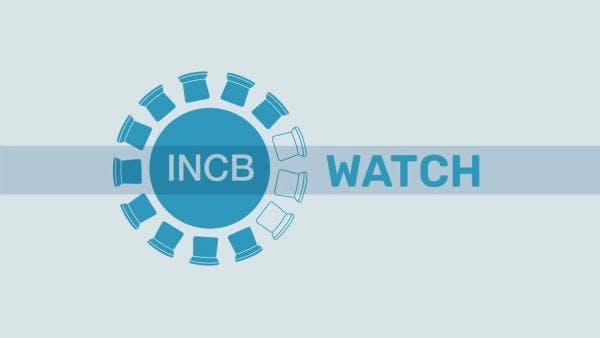INCB on therapeutic cannabis
The INCB has produced a series of alerts, including one in late June on the therapeutic use of cannabis. This INCB alert represents a much more considered discussion than some of the earlier accounts published by the Board, in keeping with the organisation’s discourse under the leadership of Werner Sipp, which ended on 14th May 2017.
The alert notes that a growing number of governments have authorised the use of cannabis for medical purposes. Such a policy is permissible under the 1961 Single Convention on Narcotic Drugs, as amended by the 1972 Protocol.
However, a number of conditions must be met by the government in question. First, they should produce estimates of anticipated consumption, which should be submitted to the INCB along with further details such as the numbers of people using the drug for medical purposes. If cultivation is planned, details of the area and geographical location must be included. Furthermore, cultivation must be accompanied by the formation of a national cannabis agency to oversee proceedings, according to articles 23 and 28 of the 1961 Single Convention.
According to the alert, the INCB has ‘urged in the past all Governments that have established programmes for the use of cannabis for medical purposes to ensure that the prescription of cannabis for medical use is performed with competent medical knowledge and supervision and that prescription practice is based on available scientific evidence and consideration of potential side effects’.
The World Health Organisation is presently reviewing the therapeutic utility of cannabis, and the results will be made available in due course.
While these are positive developments, particularly in contrast to the attitudes and position adopted by the Board in the past, they fail to engage with the problems of the present and future: the non-medical use of cannabis for pleasure and entertainment. The medical and scientific use of drugs has been permitted – at least in theory – since the foundational treaties of the Hague Opium Convention of 1912 and the following international legislation passed in Geneva under the auspices of the League of Nations.
Several of the states of the United States of America, along with Uruguay, have already permitted the legal use of non-medical consumption of cannabis (with Canada next in line), and it is estimated that cannabis is the most widely illicitly used drug, for the purpose of pleasure, in global society. It is in this territory that the INCB remains a conservative force, with the Board in its 2016 Annual Report reminding governments ‘that, in recognition of the public health risks associated with its abuse, cannabis has been subjected to the highest levels of control under the international drug control treaties through its inclusion in Schedules I and IV of the 1961 Convention’. To reiterate: cannabis is subject to the highest levels of control.
Doubtless there are pharmacological risks to health from cannabis; however, cannabis and other controlled drugs are imbued with added dangers, both medical and legal, superimposed upon it by the framework of international and national controls. It is these, too, with which we would like to see the INCB come to terms.
Keep up-to-date with drug policy developments by subscribing to the IDPC Monthly Alert.
Thumbnail: Flickr CC Steffen Geyer
Topics
Regions
Related Profiles
- International Narcotics Control Board (INCB)
